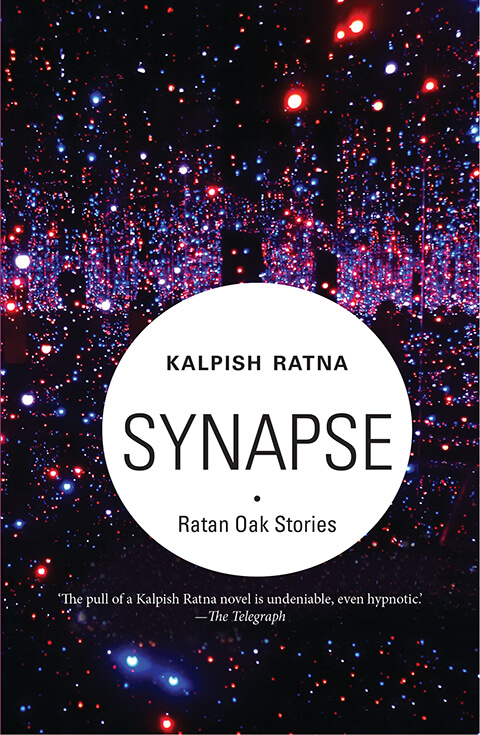In this collection of short stories by Kalpish Ratna, the intrepid microbiologist Ratan Oak, along with his great-grandfather Ramratan Oak — Bombay’s first police surgeon — jumps between nineteenth and twenty-first centuries, outwitting vedic scientists, brahminical eugenicists, lusty serial-killers and beautiful ghostly seductresses. Interspersed with crucial breakthroughs in neuroscience, and with cameos from numerous scientific luminaries, Synapse traverses time, space and the dark underbelly of scientific progress.
The following excerpt is from the story “Summum Bonum” of the book and as Ishrat and Kalpana say, “it could easily be a page from any discourse from our present moment in time.”

‘—the higher good?’
Jatinder had just asked a question which had a familiar ring.
With some embarrassment Ratan requested him to repeat it.
‘I asked you, for the fifth time, what does Hoche have to do with the higher good? I gather that’s what your father wishes to tell me.’
‘Alfred Hoche?’ asked Raki cautiously. ‘That Hoche?’
‘The very same.’
‘Never heard of him,’ retortedJitendar.
‘His ideas were very like yours,’ said Raki with venom.’And they were put into practice for the higher good.Summum bonum, the highest good.’
‘I want to read this. Is he published?’
‘Of course.’
‘WhatsApp the links to me, please.’
‘Just Google Holocaust.’
‘Sure, I’ll look it up. If it is so good it should have gone viral already.’
‘The Holocaust, Jatindar!’ Sarah was determined to educate.’The Nazis! Concentration camps! Gas chambers!’
‘Yeah. I saw that movie. Real tear jerker. Cute kid, but I thought the clown over-rated. Nowadays anybody can get an Oscar. Is that what your father was asking? If I’d seen the movie?’
‘He wanted to remind you about how doctors of an earlier age had used their power for the higher good,’ said Raki with extreme self control.’ Hoche wrote a book that was very influential. The title is self-explanatory—Allowing the Destruction of Life Unworthy of Life.’
‘Euthanasia?’ Sarah asked.
‘If you like euphemisms.’
Ratan decided to fill in the blanks.’ Seventy thousand so called imbeciles were killed by the State. All of these murders were recommended by doctors.’
‘This, do not forget, was before the Nazis targeted Jews. Imbeciles, cripples, schizophrenics, gypsies, homosexuals—anyone, everyone, who was different.’
‘One way of maintaining balance,’ persisted Jatindar. ‘Darwinism in practice.’
‘Oh no. Darwin never thought so. You ought to read him.’
‘Where’s the time, man?’
‘Then donot cite him. Forget Germany. I think the reminder was to us, about the here and now.’
‘Racial hygiene, as practiced in our midst,’ said Ratan. ‘Eliminating the Other.’
‘Oh come on, Ratan! That’s extreme,’ Sarah protested.
‘Really? Ask Zakir. Ask Radhakrishnan.’
The two named men glared back. Their faces were stone. They could have been twins, so similar were their masks of namelessness.
Jatindar shrugged. ‘That’s anecdotal.’
‘Interesting choice of word.’ Zakir broke his silence.
‘I mean—that was your experience. It need not be the general experience.’
‘Depends on your perception of ‘general.’ I think what you’re really saying is it happened to someone else. Is ‘general,’ your kind?’ asked Raki.
‘True. If something bad happened to you, my sympathies. But I’m not ready to believe it will happen to me. What happened to you, anyway?’
‘Raki, Zakir,’ Adel intervened.’You don’t have to talk about it.’
‘No? Perhaps we do. Since you ask, Jatindar, my father was murdered by Shiv Sena goons in 1966. The reason? He was a Tamizhan. That morning he went out to buy milk. The sight of a man in a veshti was provocation enough. They beat him to death just across the road from our doorstep.’
‘And here you are, forty years later, still in Mumbai.’
‘This is home. What do I care where my ancestors came from? Their lives are over.’
‘I agree,’ said Zakir. ‘My family was massacred in Ahmadabad. One day, I too will return.’
‘I’m sorry, really sorry, guys. But this is still anecdotal.’
Zakir laughed mirthlessly. Disquiet hushed the room. ‘Anecdotal? You seem fond of the word. Do you know what it means? A thing unpublished.’
‘There is enough Holocaust literature to fill all the libraries on the planet. There is enough about our own genocides. Beginning with the Partition, and then perpetrated every year since, in some corner of the subcontinent—India, Pakistan, Bangladesh, Sri Lanka. Every day the papers announce some new atrocity committed for the higher good.’
‘Hota hai.’ Jatindar shrugged.
‘Somewhere else. To someone else.’
‘Exactly. And we can’t condemn without looking for reasons.’
‘I think that’s what my father means to say,’ said Ratan.’ A doctor’s so-called powers may induce him, or her, to rationalize the most abhorrent of crimes for the higher good.’
‘Him maybe, never her,’ Sarah exclaimed.
‘Aha. Historically many of those doctors were women. German, British, American,’ Raki interjected.’ And not just doctors. That high priestess of literature, Virginia Woolf, she wrote about her visceral disgust for imbeciles and wished them exterminated.’
‘You know what I think, Ratan? Medically, I mean? About your father?’ Jatindar paused dramatically. He had the attention of the room. ‘I think your father’s words and gestures mean nothing. You read your own thoughts into them.’
‘Yes, I agree.’ Sarah gushed. ‘When you were out of range, he didnot make a sound.’
‘That is because you don’t understand his language,’ said Zakir. ‘To you, and to Jatindar, his words are unintelligible. What would you find, Adel, if you mapped their brains?’
Everybody laughed at that, Jatindar loudest of all.
‘It’s been an interesting evening.’ He reached across Arjun and shook hands with Ratan. ‘Hang in there, man.’
‘Thanks.’ Ratan smiled.
‘Oh, don’t thank me please. I’ve done nothing. It was just—just—’
‘Anecdotal.’
The word startled them into silence.
With exquisite clarity, Arjun spoke again.
‘Anecdotal.’




